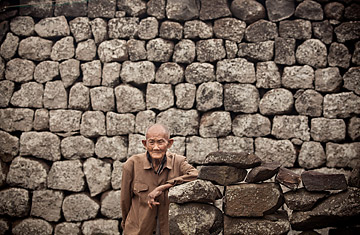
According to a new report, in November 2010, China had 178 million people over the age of 60

This post is in partnership with Worldcrunch, a new global-news site that translates stories of note in foreign languages into English. The article below was originally published in Economic Observer.
BEIJING — Proof is multiplying that China is aging at an alarming pace. If measured by international standards, China has been an aging society since 1999, announced Li Jianguo, vice chairman of China's National People's Congress. Li's remarks, as reported by Xinhua Net, were made during the presentation of the NPC Standing Committee's law-enforcement report on the Elderly Protection Act. According to this report, in November 2010, China had 178 million people over 60 years old, of which 119 million are over 65. That accounts for, respectively, 13.26% and 8.87% of the total population, and makes China the only country on the earth with more than 100 million elderly people.
But more worrying is how the statistics are set to unfold in the future: China's elderly demographic will surpass 200 million in just three years, and top 300 million by 2025. By 2042, more than 30% of China's total population will be over 60.
These numbers, says Yuan Xin, professor at the Institute of Population and Development at Nankai University, mean that China is "running headlong" into an aging society. Yet, as a particularly populous country, China is quite distinct from other societies. The report characterizes it as "an aging society with Chinese characteristics." That means, beyond the elderly group's large piece of the demographic pie, it is also a change that is happening extremely fast. Moreover, many of China's old people live alone, and a large number of disabled elderly live in hardship.
Over the past decade, the number of people over 80 years old has almost doubled to more than 20 million. As young people leave home to work in other cities, the number of elderly people living on their own has grown to 50%. Among them, 33 million of the elderly are disabled or partly disabled.
Li said China has established a basic social-pension system. There are 236 million people who participate in the old-age insurance scheme for urban enterprise workers. Currently, there are also 58 million retirees who receive state pensions (a mere 4.5% of the population), and the new rural social-pension scheme will cover 60% of all counties by the end of this year.
In 2010, for every five working-age people, there was one old person being supported. According to the new estimates, that ratio will drop to three working-age people for each elderly person by 2020.
An 'Old' Adage
Traditionally, Chinese people used to say, "Raise children in preparation of one's old age," as families were counted on to care for senior citizens. But when both the husband and wife each come from a single-child family, bearing the responsibility of four elderly parents, whether economically or physically, will become unbearably heavy.
Cai Fang, Director of the Institute of Population and Labor Economics of China's Academy of Social Sciences, pointed out that when social changes break the foundations on which traditional values were based, the pension models are bound to change accordingly.
Yet, though plenty of Chinese are accepting the idea of a public pension, in reality, there's more demand than supply in social-care services. According to the report, there are old-age beds for only 1.8% of the population in China, compared with 5% to 7% in a developed country and 2% to 3% in a developing country.
The Chinese authorities have proposed to provide up to 30 old-age beds per thousand elderly in the next five years, an increase of 3.4 million beds, an absolutely colossal task.
Experts believe that the main reason for such slow development of nursing homes in China is due to the huge long-term investment necessary, as well as the low return rate on investment. It's a sector that does not attract private capital. The NPC's Standing Committee recommended an acceleration of a public old-age nursing system, while the government should also help push the private sector into building these services.
Although China enacted the Elderly Protection Act in 1996, the rate of the demographic changes has outpaced proposed reforms. It is imperative to reform this law in order to highlight the responsibility of the government in finding the required investment and in promoting the construction of a care system for the elderly.
Also from Worldcrunch:
Alleged Mobster Nabbed Through Girlfriend's Facebook Post
— La Stampa
Drug Trade in Africa: How the Queen of Khat Got So Rich
— Die Welt
Top Libyan Rebel Leader Has Deep al-Qaeda Ties
— Le Monde
